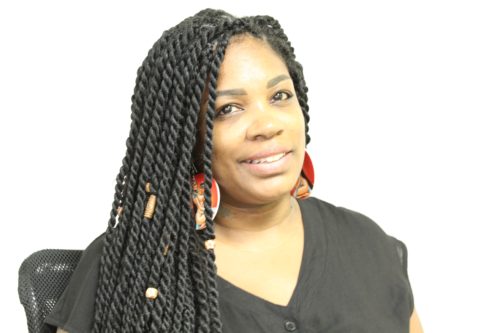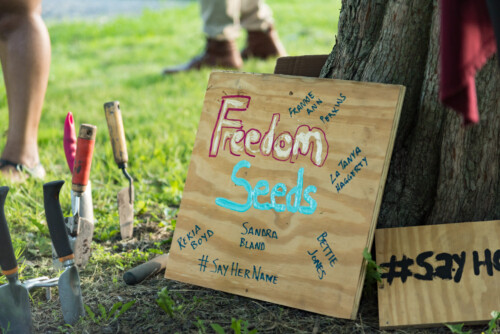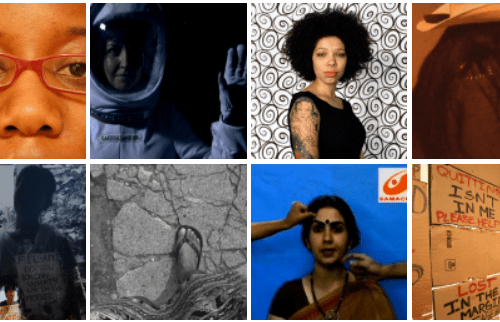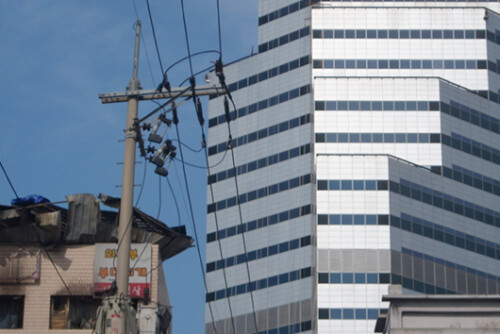I was married with three children and a fourth on the way. During the time I was pregnant with my last child – my daughter – there were so many complications happening in my life. We were facing eviction from our apartment. I was on probation for a drug case from five years prior – the product of being Black, poor, and over-policed. And my husband was about to be sent away to prison for God knows how long. After dodging my probation officer for some time because I would have tested positive for drugs, I finally built up enough courage to visit her in her office. She advised me that she had already reported me for a positive urine analysis and that I would soon be in “probation violation” status, so there was a good chance I would end up in jail with prison to follow because of the fifteen-month suspended sentence hanging over my head from the original arrest.
I always wondered what life was like for the “other side.” The people who never had to worry about being under surveillance twenty-four seven. The people who could get up and go about their day without a care in the world. Yeah, they used drugs, but they lived in an environment where their drugs were delivered to them in the comfort of their private homes. There wasn’t a cop in sight to harass them. If they woke up sick, they had the money to buy more drugs. All they had to do was make a call and, just like ordering a pizza, someone would drop off the drugs right to them. They would never find themselves in the situation that I did in the beginning of my pregnancy – one where I had to have my husband steal a car because that was my only option to get to the drugs that would keep me from suffering excruciating withdrawal.
That damned stolen car. I really wanted to forget about the stolen car, and the undercover detectives – as we call them in the hood, the “D”s – who followed, and ultimately arrested, my husband and myself. I must’ve been around four months pregnant when my husband and I were arrested together, and I’ll never forget the two nights I spent in county jail. I was lucky compared to my husband – with a fugitive warrant hanging over his head, he wasn’t going anywhere any time soon. After getting out of jail on my own, I continued to use for three or four months. I worried about my pregnancy. After all, for as long as I can remember, I was told drugs cause extreme harm to a fetus, and even possible death. I made many promises to myself to stop, but I just wasn’t ready.
Being pregnant weighed heavily on my mind, but what tormented me more was all of the people in my ear, from family members to so-called friends, who kept telling me what a horrible person I was for using while pregnant. I finally decided to enter an outpatient drug treatment program, which was extremely difficult to do in Florida. After speaking with several people I knew who were active drug users, I decided on a methadone treatment program around month seven of my pregnancy. The people I hung out with said that methadone was the way to go, since it would take away my cravings for dope and I wouldn’t wake up sick. Because methadone is a synthetic opioid, it’s often used medically as a maintenance anti-addictive for patients recovering from heroin addiction. If I was honest with myself, I wasn’t ready to stop using completely, but the shame and stigma associated with drug use followed me wherever I went. There was also the issue of my pregnancy. The same people who told me about the methadone said my baby would be okay if I took it, and once she was born she would be properly weaned off. They were my source for all information regarding drug treatment – my “street doctors,” like how in jail you have “jailhouse lawyers.”
My life was a mess. I hadn’t the slightest clue as to how to repair the damage done, and I had little to no support from my family. I had a pending court appearance for the positive drug test toward the end of my pregnancy, and it was all I could think about. When I showed up in court that day, I was remanded to county jail “pending DOC pick up”; in other words, to wait on the prison bus.
There was an enormous backlog for pick up, and I was held at the jail in solitary confinement because I was on methadone and pregnant. I was told they wanted to be able to “monitor” me twenty-four hours a day. The truth was, the officers charged with monitoring me had absolutely no idea how to treat a pregnant drug-using woman prescribed 80 mg of methadone. Every day at 7 a.m. the nurse, who didn’t know me from a hole in the wall, brought my dose to my cell, and every day she gave me a dirty look as she took my vitals. I could barely move around, with my belly feeling like the largest of all my pregnancies, in a one-person cell smaller than a closet in a studio apartment. One of the correctional officers who took to me throughout this ordeal suggested that I write a letter to the judge assigned to my case and ask for leniency. He said that since I was so close to my due date, I should ask the judge to release me so that I could go home to have my baby. It was a long shot, but what the hell, the worst he could say was “no.”
I wrote the judge a one-page letter and begged him to have mercy on me. I tried my hardest to have him see me as a human being and not just a number. I asked if, since there was a backlog on pickups, he would consider releasing me so that I could have my baby on the outside and not in this filthy environment. I detailed how the staff in the jail did not know what to do with me, and explained my situation. A week went by with no word. At the end of the following week, I was released. There was no response to my letter beyond a “pack it up” on a Friday at 6 a.m. I believe the judge must have understood my position or did not want to risk liability. Either way, after ten days in county jail I was set free temporarily to have my baby.
Three weeks later, my beautiful daughter Naisha was born. I had a Cesarean scheduled, so there was no surprise about when I would deliver – not that I had any choice in the matter because, since she was my fourth child, the ob-gyn decided I could not risk having a natural birth. As I neared the time of the delivery I spent several days attempting to not use any type of drugs or methadone. As we say in the streets, I tried to do it cold turkey. I recalled my middle-aged white ob-gyn’s reaction when I went to my last appointment, right after I was released from jail, and I told him that I had been on methadone for some time. In the most arbitrary tone I had ever heard, he said to me, “You might as well have stayed on heroin, you’re causing the exact same harm to your child!” and stormed out of the room, leaving me speechless. A feeling of embarrassment swept over me, and then defeat. It was like I just couldn’t get it right. I left his office with my head hung low and tears streaming down my cheeks and did the first thing that came to mind at that time: I stopped everything! After all, that’s what this doctor with all of his privilege and degrees was insinuating I should do, and who was I to question him?
In the prep room for my Cesarean, I began to experience severe withdrawal symptoms. It was going on almost forty-eight hours since I had taken my last dose of methadone, which is about how long it takes for it to leave your system. I don’t think I’ve ever experienced such pain and discomfort. I had severe stomach pain due not to pregnancy but to the lack of methadone my body was now beginning to realize it needed. I felt like I had to run to the bathroom before I defecated on myself. My bones felt like mush, and like if I happened to lift myself up off the bed I would just collapse to the ground. Dizziness and nausea quickly followed, along with an relentless nose drip. Not something I’d wish on my worst enemy.
`
My sister-in-law, who had accompanied me to the hospital, attempted to soothe me. But I was far beyond the point where another human could comfort me. The pain was searing. I remember telling her how I was feeling, telling her that I didn’t think I was going to make it through the C-section. At the time, she was taking Xanax for clinical depression or something of that nature. When used as prescribed, Xanax can be a good tool for people experiencing depression. She offered me a couple to take the edge off and get me through the ordeal of having a baby torn out of my stomach. I figured it would help me, at least until the anesthesiologist administered the Demerol. The pain was unbearable. For some reason, whenever I experienced withdrawal symptoms, I also experienced restless leg syndrome in my legs and arms. It’s a feeling that’s difficult to describe; it was as if my bones were in pain and I would often forcefully hit myself to feel that pain instead of the restless feeling that overcame my entire body. Xanax was sounding real good at this point.
My thinking at this time was far from clear or coherent. With a clear mind I would’ve thought about the consequences of taking something that was not prescribed to me during labor. I know that pregnant women are given all types of narcotics at birth, but it didn’t dawn on me that Xanax would show up in my baby’s test results and that I would be penalized because I did not have a prescription for it.
My daughter was born positive for Xanax and was withdrawing from methadone, which triggered the hospital staff to call child protective services. I was told I would be unable to take my baby home from the hospital, and that she was being removed from me effective immediately. There are no words to explain the emotions I felt during this time. My one and only daughter who I longed for was being taken from me. I had to figure out quickly who I trusted to care for her or else she would be placed in stanger foster care.
I turned to my brother and my sister-in-law. My husband was locked up, and his family was in New York. I had no other options, and I would have turned to them regardless, because I was headed to prison to serve the suspended sentence and would need someone to watch over my children during that time. Besides, it would only be temporary.
I turned myself in shortly after I gave birth to my daughter and was sent to prison within a couple of days. I was on an emotional rollercoaster: I’d just given birth, my body had not completely healed from the Cesarean, and I was still withdrawing from methadone. I was in agony, alone, and defeated.
My family only brought my daughter to see me once or twice while I was incarcerated, which took a toll on me. Some mothers prefer their children not visit them while they are locked up, but I wasn’t one of them. I wanted to continue to be a mother to my children. I wanted them to know how much I loved them and missed them, and that no matter what obstacles came our way, we would overcome them. My boys understood this, and I tried to be as transparent with them as possible about the whole situation. But my daughter was too young to understand, and because she was kept from me throughout this time she would never get to understand what her mother was going through.
Once my sentence was complete I was released back into society with a check for $100 and the clothes I came in wearing. It was time for me to pick up the pieces of my life. I got my boys back and began to do just that. But the fight to get my daughter back was just starting. I imagine that if I had the resources to push forward against the system and my family I would have my daughter with me now. But that’s not the case. My brother and sister-in-law had the system on their side, and they used it to take custody of my daughter, adopt her, and change her name. My boys remained with me and I continued to raise them to the best of my ability with the very few resources at my disposal. They turned out pretty great considering the challenges we all faced. My daughter, on the other hand, has never been told she was adopted and has been led to believe she grew up with her biological parents. It’s sixteen years later, and this loss still hurts like the day she was taken from me. Unfortunately the systems that tore my family apart are still running exactly as they were intended to run: they still continuously incarcerate poor women and mothers predominantly of color. Some things will never change. But I am committed to fighting alongside other mothers struggling to keep or regain their children every single day.




